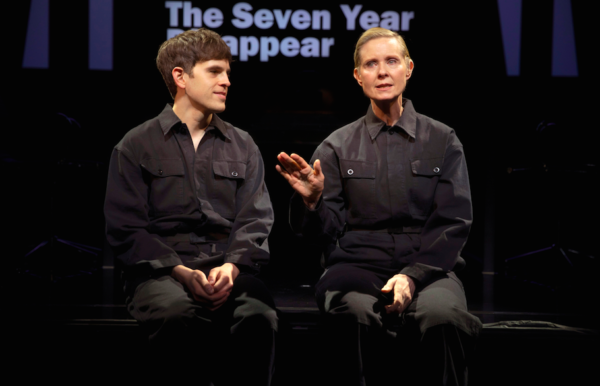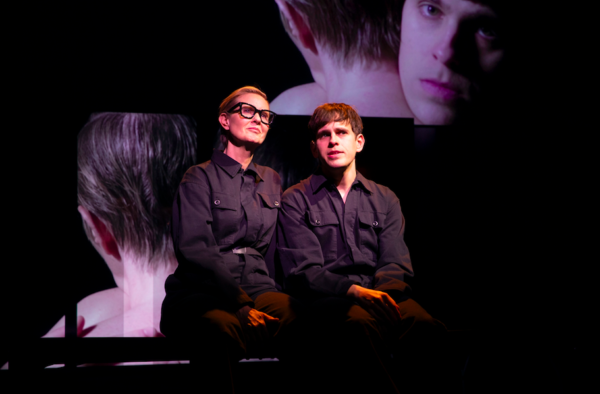Theatrical productions are like collaborative jigsaw puzzles. When the pieces—script, acting, direction, design, etc.—fit perfectly together, you have a genuine, amazing experience. But sometimes you get some extremely well-done and satisfying pieces, but they don’t quite line up or they are matched with lesser elements and the whole is less than scintillating. You walk out with a sense that something vital is missing, and you can’t put your finger on what was lacking.

Credit: Monique Carboni
That’s the case with two new Off-Broadway shows—a play and musical. Both contain professional, even exemplary parts, but neither completely adds up. The Seven Year Disappear, Jordan Seavey’s creative and occasionally gripping two-character piece presented by The New Group at the Signature Center has fine acting, imaginative direction and some sizzling writing, but Seavey’s central intent or theme is unclear. Likewise, The Connector, a pulse-pounding, off-beat tuner from Jason Robert Brown (score) and Jonathan Marc Sherman (book), has an interesting story to tell, but its ultimate message is fuzzy.
Disappear follows the dysfunctional relationship between self-centered performance artist Miriam and her gay son Naphtali who is also her business manager. Just as Miriam is about to accept a prestigious commission from the Museum of Modern Art, she pulls the titular vanishing act and remains off the grid, even to her son, for seven years. After a spiral of political disillusion, drug and alcohol abuse, and numerous disastrous affairs (including one with Miriam’s former lover Wolfgang), Naphtali finally seems to have his life back together, just barely. But Miriam comes crashing back on the scene, pulling her son back into her whirlpool of entitlement and narcissism, all in the name of her art.

Credit: Monique Carboni
Seavey hopscotches back and forth in the timeline, tracing the strained union between mother and son as Miriam exploits the people in her life for her work and Naphtali attempts to establish his own identity. In addition to vivifying the larger-than-life Miriam, Cynthia Nixon plays all the other parts, switching genders and sexualities with dexterity and conviction. She creates a galaxy of diverse personalities from an insecure, sexually ambiguous manicurist to a vacuous actress friend to the domineering Wolfgang. Taylor Trensch is equally adept at conveying the varying stages of Nephtali’s unraveling. In one scene, he’s confident and charismatic like his mom, in the next he’s a sobbing drunken mess. Dressed by Qween Jean in utilitarian black costumes so they can assume multiple personae, the pair play off each other beautifully.
Director Scott Elliott keeps things moving quickly and smoothly. Each scene is briskly paced and contains a beginning, middle and climax. Transitions are handled cleanly. He also makes the time of each scene clear with the aide of Derek McLane’s simple set and John Narun’s projections which give us the date of each vignette and where it fits in the timeline. Narun’s videos and projections add texture. Seavey delivers numerous touching and scorching scenes for two but he never completely clarifies the motive behind Miriam’s absence or the message behind her work.
The dynamic between artistic expression and personal bonds appears to be the central theme, but Seavey’s stand on the issues is not clear. Also we don’t learn a great deal about Miriam or her art, so it’s hard to care about her life or career. We do learn about Naphtali’s struggle and Trensch’s sensitive performance helps, but there is still a gaping hole in the middle of this otherwise compelling piece.

Credit: Joan Marcus
The Connector is similarly unsatisfying despite a solid cast, an energetic score from Jason Robert Brown, snappy script by Jonathan Marc Sherman, and assured direction by Daisy Prince. This compact musical presented by MCC Theater explores the trend of print journalists inventing sources and facts, perhaps inspired by the real-life examples of Stephen Glass of The New Republic, Jayson Blair of The New York Times and Janet Cooke who returned her Pulitzer Prize after it was revealed her stories for The Washington Post were fabricated.
Set in 1995-97 New York, the action takes place at the fictional title magazine and focuses on the rocket-like rise and just-as-rapid fall of flashy scribe Ethan Dobson (a kinetic Ben Levi Ross). His quirky, colorful character studies catch the eye of grizzled editor Conrad O’Brien (Scott Bakula exuding shaggy charm) and his stories are soon appearing regularly to acclaim in the Connector. Ambitious copy editor Robin Martinez (a commanding Hannah Cruz) smarts at being passed over for publication—there’s obvious sexism at play—and she begins to detect inconsistencies in Ethan’s articles. Diligent fact-checker Muriel (Jessica Molaskey in a powerful supporting performance) and sorta loopy reader Mona Bland (off-beat and memorable Mylinda Hull) also smell a rat. Eventually, Ethan’s features lead to big trouble for the mag.

Credit: Joan Marcus
Sherman’s book seems to be making the point that sloppy reporting and dazzle over substance are destroying journalistic integrity and by extension all of American culture. But just as Seavey doesn’t sufficiently develop Miriam in Disappear, Sherman offers little insight into Ethan’s pathology or his background, other that he’s from New Jersey and has a brother. Sherman does write tangy, rapid dialogue and Brown’s songs are zestful and neatly staged by Prince. But the central message is still somewhat obscure. Ethan’s climactic breakdown after his deception is revealed further confuses matters, as he lumps his fantasies in with major real events. Then in an admittedly effective coup de theater (no spoilers), Prince, Brown and Sherman appear to indicting all media for mendacity. Also, there are extraneous numbers such a sojourn to Israel for Ethan which feels inserted into the action solely to give Brown an opportunity to add some Middle-Eastern-flavored music and to give Ethan an excuse to delay the wrath of Miles.
Bakula has a mature charisma as the veteran editor and Ross and Cruz have commanding vocal and acting skills. Max Crumm and Fergie Philippe have show-stopping solos as two of Ethan’s contacts. All participants deliver admirable work, but this Connector just doesn’t connect to deliver a strong, clear message.
The Seven Year Disappear: Feb. 26—March 31. The New Group at the Alice Griffin Jewel Box Theater/Pershing Square Signature Center, 480 W. 42nd St., NYC. Running time: 90 mins. with no intermission. thenewgroup.org
The Connector: Feb. 6—March 17. Robert W. Wilson MCC Theater Space, 511 W. 52nd St., NYC. Running time: one hour and 40 mins. with no intermission. mcctheater.org.
